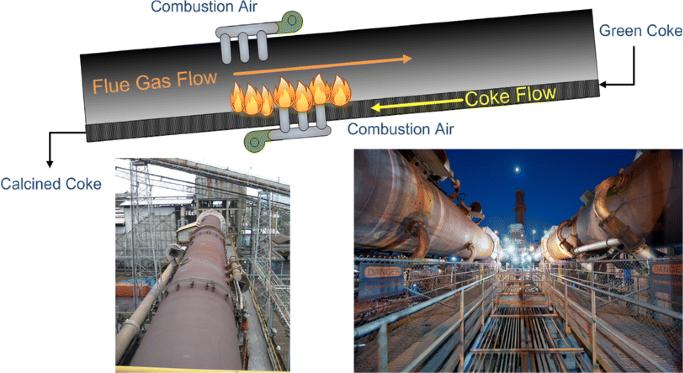
Petroleum coke, often referred to as pet coke, is a carbonaceous solid derived from the refining of crude oil. It has a wide range of industrial applications, including as a fuel source and in the production of aluminum, steel, and various other products. One crucial step in the utilization of petroleum coke is the calcination process, which plays a pivotal role in modifying its chemical and physical properties. This article explores the calcination process of petroleum coke, shedding light on its significance and the various stages involved.

Petroleum coke is a byproduct of the oil refining process. It is typically black or dark grey in color and composed primarily of carbon with trace amounts of sulfur, metals, and other elements. The quality and properties of petroleum coke vary depending on the type of crude oil and the refining process used. Low-quality coke is often used as fuel, while high-quality coke finds application in the production of anodes for the aluminum industry, among other uses.
Calcination is a high-temperature process that drives off volatile materials and further reduces the carbon content of petroleum coke. The importance of this process lies in enhancing the coke's properties to meet specific industrial requirements:
During calcination, petroleum coke is exposed to temperatures between 1200°C and 1400°C in an oxygen-deprived environment. This process effectively removes volatile compounds, such as hydrogen and sulfur, making the coke more suitable for various industrial applications.
Calcination increases the carbon content of petroleum coke, making it a valuable material for industries that require high carbon content. The resulting calcined coke has improved electrical conductivity, which is essential for applications in the aluminum industry.
The calcination process also influences the physical properties of petroleum coke. It can result in increased particle density, reduced porosity, and improved particle size distribution, making it suitable for use in anodes and other specialized applications.
Before subjecting petroleum coke to high temperatures, it undergoes preheating to reduce thermal stress and improve energy efficiency. The temperature is slowly raised to prepare the coke for the subsequent calcination stages.
The preheated coke is then introduced into a calcination furnace, which is maintained at the desired high temperatures (typically between 1200°C and 1400°C) while keeping the environment oxygen-deprived. This prevents combustion and ensures that only volatile materials are removed.
After calcination, the coke is rapidly cooled to prevent re-absorption of volatile materials. Controlled cooling is essential to maintain the coke's desired properties and prevent the development of undesirable characteristics.
The final calcined coke is typically crushed, sized, and screened to meet specific customer requirements. This step ensures that the product's physical properties, such as particle size and density, are consistent and suitable for its intended use.
Calcined petroleum coke finds application in various industries:
One of the primary uses of calcined coke is in the production of anodes for the aluminum smelting industry. The high carbon content and excellent electrical conductivity of calcined coke make it an ideal material for this application.
Calcined coke is used as a carbon additive in the production of steel. It improves the quality of steel and reduces the need for coking coal, which can be expensive and environmentally detrimental.
Calcined petroleum coke is also used in various applications such as fuel for cement kilns, in the production of titanium dioxide, and as a reducing agent in the production of ferroalloys.
The calcination process of petroleum coke is a crucial step that enhances its quality and suitability for a range of industrial applications. By removing volatile compounds, increasing carbon content, and improving physical properties, calcined coke becomes a valuable material in industries such as aluminum and steel production. Understanding this process is essential for optimizing the performance and cost-effectiveness of various industrial processes that rely on petroleum coke as a key ingredient.

Write a Message